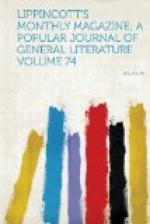“‘Why, father,’ she says, ‘I don’t so much as know his name: do you?’
“I told her no, I didn’t; that if I’d heard his name I disremembered it, but that I didn’t think I’d heard it. And then that very night come another visit from mother, and she told me all about it. She come the way she always did, and when she spoke the last time, close to, as you may say, she says,—
“’I wouldn’t give up that ten dollars so easy, if I was you, father. That peddler’s name is Hanigan,—Elwood Hanigan,—and he’ll be at the State Fair to-morrow. Now, do you go, and you’ll find his red wagon with no trouble at all; and jest be right down firm with him, and tell him that if he doesn’t give you good money in place of the bad he foisted off on you you’ll show him up to the whole fair, and you’ll see how glad he’ll be to settle it.’
“And with that she laughed jest as natural as life, and I heard no more till Gracie knocked on my door in the morning.”
“And did you go to the fair and find him and get your money back?” asked Birchard, who was interested in spite of his scepticism.
“I did, jest that,” replied Uncle Jabez. “I got off bright and early, and, as luck would have it, I’d jest tied and blanketed my horse when that wonderful smart red wagon come drivin’ in at the gate. I waited till he’d begun to pull his wares out and make a fine speech about ’em, and then I jest walked up to him, cool and composed, and give him his choice between payin’ me good money for his bogus gold or hearin’ me make a speech; and you may jest bet your best hat he paid up quicker’n winkin’. Perhaps I’d ought to have warned folks ag’in’ him as it was, but I had a notion he’d save his tricks till he got to another neighborhood; and it turned out I was right. He didn’t give none of his gold change out that day. But you can see for yourself that if it hadn’t been for Lavina he’d have come off winnin’ horse in that race. That was always the way when mother was about: she had more sense in her little finger than I had in my whole body, and head too, for that matter.”
“And you found that you really had not known the man’s name until it was conveyed to you in the manner in which you have described?” asked the schoolmaster deferentially.
“Well, no,” said Uncle Jabez. “When I saw his wagon the next day, I remembered of readin’ his name in gilt letters on the side, tacked to some patent medicine he claimed to have invented; but I don’t suppose I’d ever thought of it again if mother hadn’t told it to me so plain.”
The schoolmaster said nothing. He had his own neat little theories concerning all the manifestations which had been mentioned, but somehow the old man’s guileless belief had touched him, and he had no longer any desire to shake it, even had it been possible to do so. But he could not help probing the subject a little further: so presently he asked, “And you’ve never spoken to her, never asked her if it were not possible for you to see as well as hear her?”




